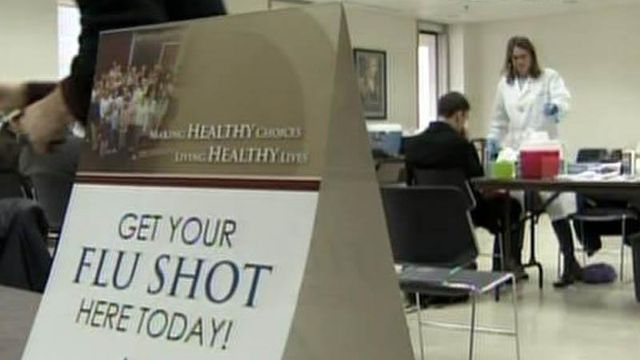College students immune to calls for vaccination
Area college campuses have plenty of supply of the H1N1 flu vaccine, but not so many students lining up to get it.
Posted — UpdatedPublic health officials said having students living in close quarters in dormitories puts them at higher risk for contracting the H1N1 virus. They expressed concern that many students don't think they need to be vaccinated.
"I guess I would have liked to see some lines right now," said Mary Beth Koza, environmental health and safety director at the University of North Carolina-Chapel Hill.
UNC has held immunization clinics at the Frank Porter Graham Student Union on campus in recent weeks, but it's never experienced the lines that clinics held by county health departments have seen repeatedly since October.
"I thought everyone would be knocking down our doors, and the first week we had it on campus, we had a great response," Koza said, adding that demand has tailed off since then.
The university has distributed less than half of its 14,000 doses of vaccine so far, she said.
Although H1N1 has left UNC freshman Lillian Chason in critical condition at UNC Hospitals, many students said they aren't worried about catching the virus.
"I've been around it a lot the first week of school, and I didn't get it. So, I don't know, I'm taking my chances," UNC sophomore Taylor Haskin said.
"I think most of us think the worst of it has already happened, so a lot of people just kind of think there is not really a big risk anymore," UNC senior Chelsea Hicks said.
Health officials said pandemics like H1N1 tend to come in three waves, and the U.S. is in the second wave. The vaccine could head off a third one, they said.
"It's frustrating to me because I know I have the vaccine. I know I can prevent the third wave," Koza said.
Officials predict the third wave of H1N1 could come during the traditional period for seasonal flu, from February to April. The holiday travel season could accelerate the arrival of that wave, they said.
Even people who think they've had H1N1 should get the vaccine unless they actually were tested for the virus, health officials said.
Koza said about 15 percent of students, faculty and staff at UNC have been vaccinated, which is the highest rate at area universities.
About 11 percent of the student population at North Carolina State University has been vaccinated, while more than 9 percent of eligible students at Duke University have received the vaccine, officials said. North Carolina Central University officials couldn't provide figures for vaccinated students, noting the school plans to hold its first major immunization clinic on Wednesday.
UNC freshman Courtney Kelly had a confirmed case of H1N1 earlier this year, and she urged other students to get vaccinated.
"I would say, if you have the opportunity, go ahead," Kelly said. "It's not fun, so if you can avoid it, it's a good thing."
• Credits
Copyright 2024 by Capitol Broadcasting Company. All rights reserved. This material may not be published, broadcast, rewritten or redistributed.






